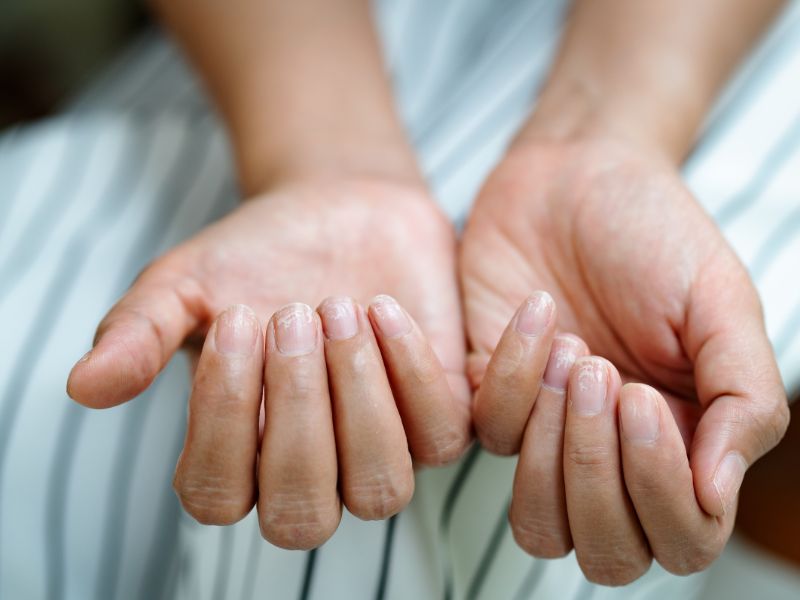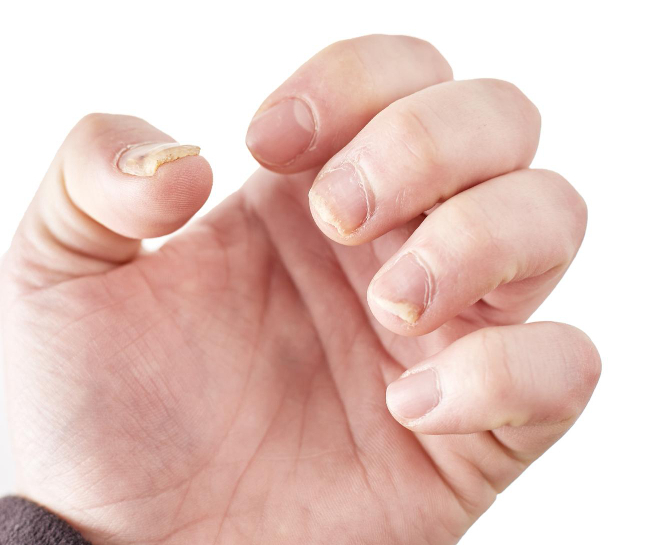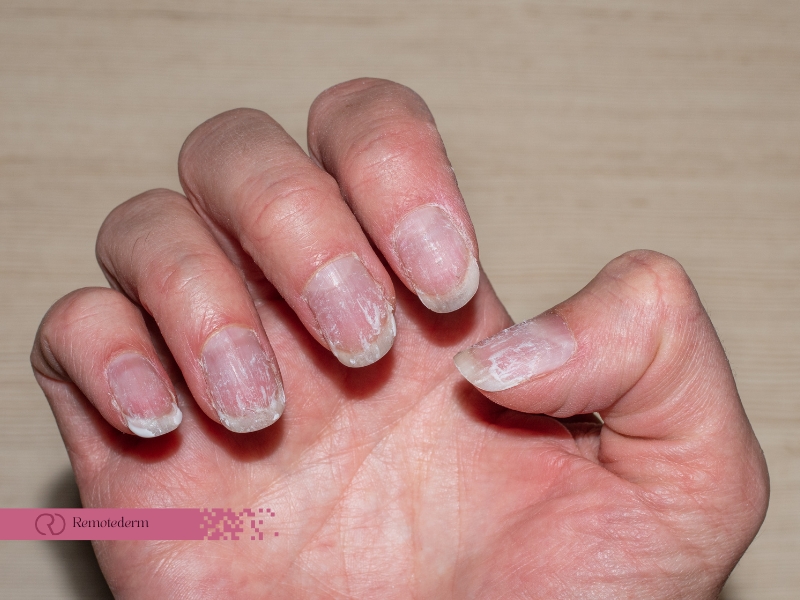Do you notice your nails breaking, splitting, or chipping easily? If so, you might be dealing with brittle nails. Brittle nails can be a frustrating and sometimes painful condition that affects many people in Canada and beyond. In this comprehensive guide, we will explore the symptoms and causes of brittle nails, as well as treatment options to restore nail health. We’ll also provide tips on when to seek medical advice for this condition.
What Are Brittle Nails?
Brittle nails are nails that crack, split, or break easily. This condition can affect both fingernails and toenails, though it is more common in fingernails. Brittle nails may feel thin, soft, or even peel away from the nail bed. While occasional breakage can be a result of everyday wear and tear, consistent issues may signal an underlying problem.
Brittle Nails Symptoms
Recognizing the symptoms of brittle nails can help you identify the condition early and take steps to address it. Common symptoms include:
- Cracking: Nails may crack or split easily, even with minimal pressure.
- Peeling: Nails may peel away from the nail bed or have layers that separate.
- Weakness: Nails may feel weak or soft, making them prone to breakage.
- Discoloration: In some cases, nails may appear yellow or have other changes in color.
In some situations, these symptoms may be accompanied by pain or discomfort, especially if the nails break close to the skin.

What Causes Brittle Nails?
Brittle nails can be the result of a variety of factors, and understanding these causes is essential for managing and preventing the condition. Here’s a closer look at some of the most common reasons for brittle nails:
- Dehydration: One of the primary causes of brittle nails is dehydration. When your body lacks sufficient water, your nails can become dry and brittle, leading to splits and breakages. This is especially prevalent in dry or cold climates, such as those experienced in many parts of Canada during the winter months.
- Aging: As we age, our bodies undergo various changes, including changes in our nails. Nails tend to grow slower and may become more fragile and brittle over time. This natural aging process can contribute to the development of brittle nails.
- Nutrient Deficiencies: A lack of essential nutrients such as iron, zinc, or biotin can significantly impact nail health. These nutrients play a crucial role in maintaining the strength and resilience of your nails. A deficiency can lead to weak, brittle nails that are prone to splitting and breakage.
- Chemical Exposure: Frequent exposure to harsh chemicals, such as those found in cleaning products, nail polish removers, and certain types of nail polishes, can weaken the nails. Prolonged exposure to these substances can strip nails of their natural oils, making them dry and fragile.
- Medical Conditions: Various medical conditions can cause brittle nails. For example, thyroid disorders can disrupt the balance of hormones in your body, affecting the health of your nails. Anemia, a condition characterized by low levels of red blood cells, can also lead to brittle nails due to insufficient oxygen and nutrient delivery to the nails.
- Nail Diseases: Certain nail diseases, such as psoriasis, fungal infections, and eczema, can cause noticeable changes in nail texture and strength.

Treating and Preventing Brittle Nails
Once you understand the reason behind your brittle nails, you can take specific steps to restore your nails’ health and prevent future brittleness. Here are some tips to guide you on your journey toward stronger, healthier nails:
- Moisturize Regularly: Hydration is key to maintaining nail health. Apply a moisturizing cream, oil, or balm to your nails and cuticles daily. Natural oils like jojoba, coconut, or almond oil work particularly well.
- Use a Gentle Nail File: Filing your nails is essential for shaping and smoothing, but it should be done with care. Use a fine-grit nail file to gently shape your nails in one direction. Avoid a back-and-forth motion, as this can create micro-tears and weaken your nails.
- Limit Chemical Exposure: Harsh chemicals found in cleaning agents, detergents, and even some beauty products can strip nails of their natural oils and weaken them. Wear gloves when cleaning and be mindful of the products you use.
- Take Supplements: Nutrient deficiencies, especially those involving biotin, iron, or zinc, can contribute to brittle nails. Speak to a healthcare provider to determine if a supplement regimen might be right for you.
- Nail-Friendly Products: Be selective with your nail care products. Opt for nail polishes, removers, and treatments that are free of harsh chemicals such as formaldehyde, toluene, and DBP. Avoid acetone-based polish removers, as they dry out your nails.
- Protect Your Nails: Avoid using your nails as tools and wear gloves during activities that might expose your nails to injury, such as gardening or heavy lifting.

When to Seek Medical Advice
If your brittle nails continue despite trying home remedies, or if you observe additional changes in your nails such as ridges, pitting, or discoloration, it may be necessary to seek medical advice. Nail online dermatology services can offer valuable insights and guidance in determining the cause of your brittle nails and recommending suitable treatment options. Additionally, a nail diseases chart can serve as a useful reference to help identify different nail conditions and their associated symptoms, aiding you in deciding when to pursue medical attention.
Final Thoughts
Brittle nails can signal underlying issues like dehydration, nutrient deficiencies, or medical conditions. Canadians can improve nail health by moisturizing regularly, using gentle products, and ensuring a diet rich in biotin, iron, and zinc. Limiting chemical exposure is also key. If brittle nails persist or show other signs like ridges or discoloration, it’s important to seek professional advice. Online dermatology services in Canada can help diagnose and treat nail concerns, ensuring your nails stay strong and healthy.
FAQs
Can certain medications cause brittle nails?
Yes, some medications, such as those for chemotherapy, may affect nail health and cause brittleness. Consult your doctor if you suspect your medication is affecting your nails.
Can diet impact the health of my nails?
Absolutely. A diet lacking in nutrients such as iron, zinc, and biotin can lead to brittle nails. Ensure you are eating a balanced diet rich in vitamins and minerals.
Are there any home remedies for brittle nails?
Yes, home remedies such as soaking your nails in olive oil or applying a mixture of lemon juice and olive oil can help strengthen your nails.
Is nail polish bad for brittle nails?
Not necessarily, but using nail polish with harsh chemicals or not allowing your nails to breathe between polish applications can worsen brittleness. Opt for nail-friendly products and give your nails a break periodically.
